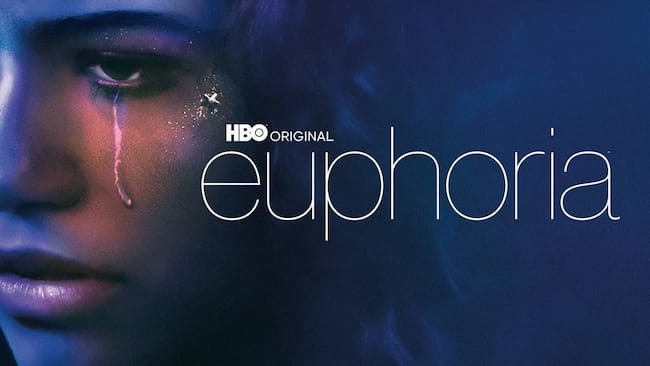This bridge to the series’ second season fills in the gaps in the story of the character played by Hunter Schafer, who shines as an actress and co-writer.
“Why did you run away?”, A psychologist asks Jules (Hunter Schafer) in the first seconds of ‘ Euphoria: The perfect am marla (Part 2: Jules)’, one of the big questions that remained pending at the end of the first season of ‘Euphoria.’
His answer will come in the form of 55 minutes of reflections, fantasies, and nightmares within the character’s psyche, but, first, the camera freezes in a detailed shot of Jules ‘blue eye, in which they are projected to the rhythm of’ Liability’ of Lorde all the moments she has shared with Rue (Zendaya).
It is an image that not only works as a fast-paced and nostalgic summary but also as a declaration of intent: this second special episode is a gateway to an inner world created by the protagonist, who has projected so many imaginary fantasies that, when push comes to shove, reality has been a complete disappointment.
The HBO series, created by Sam Levinson, began by telling us about Rue’s struggles to find a reason to detox and live in a pain-filled world that she doesn’t want to be a part of (‘Euphoria: Striped Are Not Eternal (Part 1: Rue)’), and now continues with Jules’ perspective in’ Euphoria: The perfect am marla (Part 2: Jules)’, which does not really offer new revelations in narrative terms, but rather elaborates a study of a character that Despite having had great moments in the past, she has lived in the shadow of the protagonist of the story.
Now it is her turn to open the channel and confess what is behind that fear and confusion that led her to flee. But answering that question asked by Dr. Mandy Nichols (Lauren Weedman) at the beginning of the episode is more complicated than it seems.

Jules speaks here of her deepest fears, such as the obsession with conforming to a specific type of canon femininity. “Somewhere along the way, I think femininity conquered me,” she says, feeling “a fraud” because of how her transition has been defined by female beauty standards and, also, the longing for male desire. “I think I have defined all my femininity around men, when, deep down, I am no longer interested in uncles, like that, as a concept,” she says at another time.
The episode shows us a deep identity crisis in Jules, who is thinking about stopping taking hormones. In the intimacy and honesty of her monologues about the trans experience, we see the hand of her own Schaffer, who co-writes the episode with Levison.
But what we find most in ‘Euphoria: The perfect am marla’ is not only her problems but also how she has hidden from them for so long. Jules confesses to being in love and fantasy. When you live in a reality where you can barely breathe, sometimes the only possible oxygen bag is your own imagination.
Thus, the character lets us enter a mind full of illusions, where, for example, virtual relationships are better than those experienced in person because they won’t disappoint you so much. After all, 50% is put by your head.

There is a certain portrait of Gen Z as a generation that understands social networks as a refuge, as a cover for fears, and, at the same time, as a channel for them. In the end, that’s what ‘Euphoria’ is all about: putting ourselves in front of a new youth where uncertainty and hopelessness seem more pronounced than ever.
The two episodes that act as a bridge between the first and second seasons of the series have the same objective of looking closely at one of its main protagonists, but, even so, they are very different in shape.
The first had more discursive weight. His reflection was so powerful that he needed nothing more than a table in a bar and a conversation. Still, this second episode is more in tune with the staging of the rest of the series nightmarish inserts and musical moments. Media such as Variety have criticized Levinson’s resorting to more coups to mask an episode with nothing new to say.
However, it could also be argued that each response to the status of its protagonist: Rue is stagnant and unable to move forward with her rehabilitation (hence the action is trapped in one location, which pays homage to Edward Hopper’s ‘Nighthawks’), while at the center of Jules’ episode is her overflowing imagination, the fantasies he constantly projects in his head.
To portray that state between crisis and catharsis, we needed to get out of that talk with the psychologist; we had to fly with her in her illusions and self-constructed images. Live the spiral of images coexists hand in hand with the reality in her mind. Each episode responds directly to the personality and vital status of its protagonists.

If the Hollywood industry were fair, Hunter Schafer should be one of the next big stars on the screen. The way he projects his speech with a complex mix of strength and fragility, determination and doubt, pride and shame … It is ravishing.
A talent that carries the emotional charge of this episode on its shoulders and an important part of ‘Euphoria,’ which has marked its acting debut. We do not know what will bring him in the second season that will foreseeably arrive at the end of 2021, but his Jules (because he belongs to him as much as Levinson) is one of the fascinating characters of the moment. Stay tuned for the next update.
